
IRVINE, CA – A sense of accomplishment permeated the air as selected guests mingled at what was billed as a “celebratory reception” at the University of California, Irvine to officially mark the establishment of the Thakkar Family-Dharma Civilization Foundation (DCF) Presidential Chair in Vedic and Indic Civilization Studies.
In the program that followed, with a slew of speeches, Pulitzer Prize-winning author and Director of UCI’s Religious Studies Program Jack Miles, termed DCF and UCI as “natural partners,” and drew attention to the university’s coat of arms which reads ‘Fiat Lux’—‘Let There Be Light’ in Latin. Lauding the permanent establishment of the chair, Miles said it was essential to understand the dharmic traditions , without which comprehending the world as a whole is not possible. He said, “today the first words of a story are being written,” and it is one, “that would continue through the years.”
Affirming what Miles said, Thakkar in his talk called out to all “to leave a lasting legacy.” He envisioned a larger role at UCI with an India Center where different fields of study related to India could be engaged. “It is not easy,” he quipped, “nothing worthwhile is.” Over 700 temples of worship have been created in the U.S. he said, “now let’s create temples of education.”
Thakkar began his talk by invoking the memory of his late parents with gratitude and saluted the elders in his family asking those present to rise as he said, “This occasion is actually to celebrate all of you because you have instilled in us the culture that has made us better; and by this generous gift, you have not only bettered us but also given the opportunity of knowledge about our tradition to anyone who is thirsty for this knowledge. This effort will offer scholars and students from all over the world a unique insight into Indic civilization and the Vedas.”
For DCF, May 9 marked another milestone in helping establish the systematic and academic study of Dharma. In his presentation, Dr.Manohar Shinde, the founding chairman of DCF, stated that the need for a proper narrative on Hinduism was felt and would be aided by an academic approach. He said DCF had taken part of its inspiration from those who had individually pioneered this thinking, including SoCal’s Navin and Pratima Doshi, the late Dr.Mohinder Sambhi and Uka Solanki. He harked back quickly to the engagement with the Graduate Theological Union at Berkeley, where DCF has created a center for the study of Dharma in general and Hindu Dharma in particular. He said, under the auspices of ISKCON and the Arsha Vidya Gurukulam, studies on Vaishnavism and Adi Sankara are on the anvil.
Dr. Shiva Bajpai, the founding trustee and president of DCF, spoke at length about Sanatan Dharma and its meaning. Swami Ishwarananda, head acharya of Chinmaya Mission Los Angeles, pointed out that following the path of right was everyone’s privilege. Just like the five elements – earth, water, fire, air and space – are spread impartially around the world and are needed for survival, dharma is something that cannot be owned by any single group but finds its greatest expression in India and its culture. Dharma was so universal and so inclusive that the reason for India’s culture to have survived the millennia was just this.
Consul General of India Venkatesan Ashok was his erudite self, making the case for India studies at academic institutions. He pointed toward the size of the population, its democracy, strong Indo-U.S. ties, and then noted, "India’s long past has yielded a fountain of knowledge and wisdom and expedience which can benefit our world today.” He cited yoga, ayurveda, the use of cinnamon, neem and turmeric and various other daily practices of India’s forefathers which are now being paid attention to by health practitioners. Ancient science also gave the world the concept of zero, the so-called Arab numerals and the idea of earth spinning on its axis much before Copernicus, he said. Ashok said a relevant study of India would include the contributions of ancient India to the world including a range of subjects from Sanskrit, Tamil and Pali languages to art, history, cuisine and spiritual thought as well as modern India’s political and social outlook. The government of India, he said, was ready to support such endeavors and willing—among other things—to provide educational material, faculty and slots in Indian universities for North American students to study subjects related to India. Georges Van Den Abbeele, Dean of the School of Humanities who took on the role of emcee, was thanked by several speakers for his open mindedness and making the establishment of the chair a reality. Also mentioned by him and others were Dr.Keith Nelson and Dr.Gerald Larson.


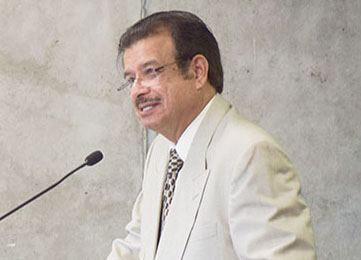
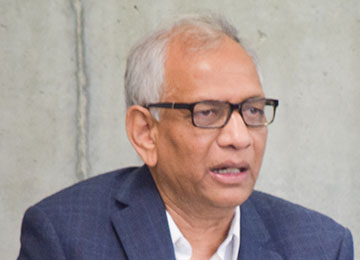
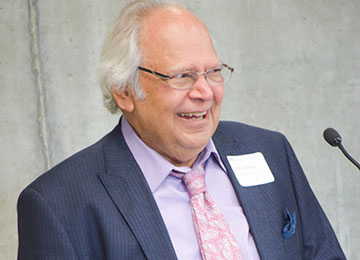
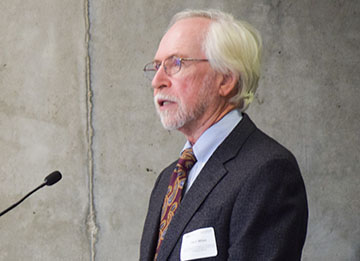
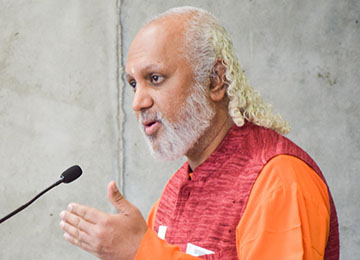
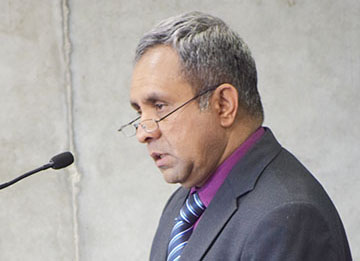
 RSS Feed
RSS Feed
